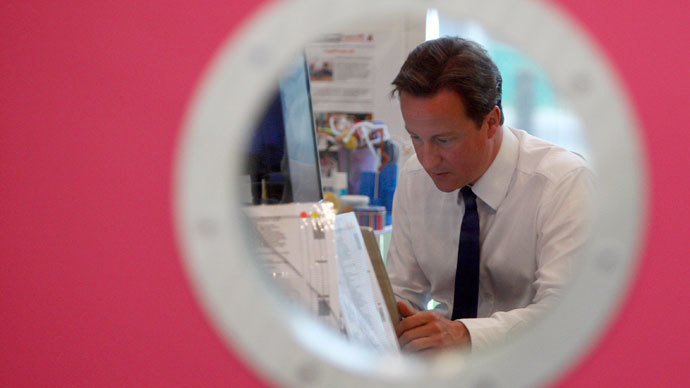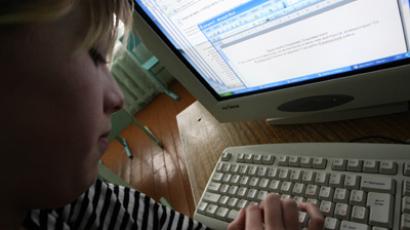‘Unavoidable choice’: Cameron readying UK internet porn block

British PM David Cameron has announced that all UK households are to have their access blocked to online pornography unless they choose to ‘opt in’. By the end of next year, households will have to accept or decline an automatic porn filter.
In his new plans, Cameron unveiled a series of measures targeted at blocking public access to all forms of online porn. The PM has repeatedly told the British public that access to online pornography in family homes risks “corroding childhood.”
All 19 million homes of internet users will have to inform their
Internet Service Providers (ISPs) if they want access to
pornographic content online, according to the Guardian.
As a preliminary step, people who set up new broadband accounts
or switch subscriptions will be told to make the choice by the
end of this year, and those wanting access to online porn will
have to disable the filters approximately a year early.
Hey @David_Cameron - I've thought about it all for about a second & I'm certain that porn is probably the least of this country's problems.
— Andy Dawson (@profanityswan) July 22, 2013
“In a really big step forward, all the ISPs have rewired their technology so that once your filters are installed, they will cover any device connected to your home internet account,” Cameron said, commenting that the one choice would be applicable to all devices in the home.
The Child Exploitation and Online Protection Centre (CEOP) is in
the process of drawing up a blacklist of search terms deemed
‘horrific,’ and online searches are to be redirected to
information about the new law instead of wielding search results.
“You have a duty to act on this — and it is a moral duty,” Cameron said speaking directly to search engines such as Yahoo, Google and Bing.
Search engines have been given until October to block illegal
content with the government already looking at the legislative
options to force action.
David Cameron isn't banning porn completely at all. He's just making it less accessible for younger people. WHY DO PEOPLE NOT LISTEN!
— Kate Manning (@KateMangina) July 22, 2013
Cameron claims that the move will have a special focus on the
protection of children, and aims to criminalize porn that
features scenes of rape or sexual violence, under the banner of
“extreme pornography.”
Changes in legislation would mean that the distribution of online videos involving such content would be restricted, with ‘extreme’ meaning those that would not receive licenses to be sold in UK sex shops.
“The first challenge is criminal: and that is the proliferation and accessibility of child abuse images on the internet. The second challenge is cultural: the fact that many children are viewing online pornography and other damaging material at a very young age and that the nature of that pornography is so extreme,” the PM stated.
“Although it’s been a crime to publish pornographic portrayals
of rape for decades, existing legislation does not cover
possession of this material,” Cameron said. While this is the
case in England and Wales, Scotland already has laws in place.
Attempt to implement 'laughable' deterrent
Operators had agreed to automatically install adult content
filters on phone networks, according to the PM. Cameron noted
that WiFi networks would not be able to avoid the measures.
The UK PM also attempted to tackle the subject of illegal file
sharing platforms saying that experts from the CEOP are to be
given further powers to enable them to examine secretive file
sharing networks.
“From next year, we will also link up existing fragmented
databases across all the police forces to produce a single secure
database of illegal images of children which will help police in
different parts of the country work together more effectively to
close the net on pedophiles,” he said.
“It will also enable the industry to use the digital hash tags from the database to pro-actively scan for, block and take down these images wherever they occur.”
The program will not necessarily stay within the country’s borders. Cameron mentioned a secretive joint UK-US taskforce which he could not “go into detail about…because that would undermine its effectiveness.”
If Cameron really goes for this porn filter, then he ABSOLUTELY has to ban page 3 girls. But he won't do that, cos Murdoch. #goit
— Simon Riley (@that_taxi) July 22, 2013
Cameron insisted that he was acting as a father and a politician
rather than a scaremonger. However, his declaration raised a
number of questions among critics who question who would decide
what constituted pornography, whether the continuation of the
British Murdoch-owned national newspaper ‘The Sun’s’ Page 3 would
be allowed to continue, and how the distribution of material
through p2p and social networking platforms such as Twitter would
be enforced.
“Let’s create a real deterrent, not a pop-up that pedophiles
will laugh at,” Jim Gamble, a former deputy chief
constable and chairman of CEOP told the Evening Standard.
“There are 50,000 predators we are told by CEOP downloading
images from peer-to-peer, yet from Ceop intelligence only 192
were arrested last year,” he said. “That’s simply not good
enough.”














